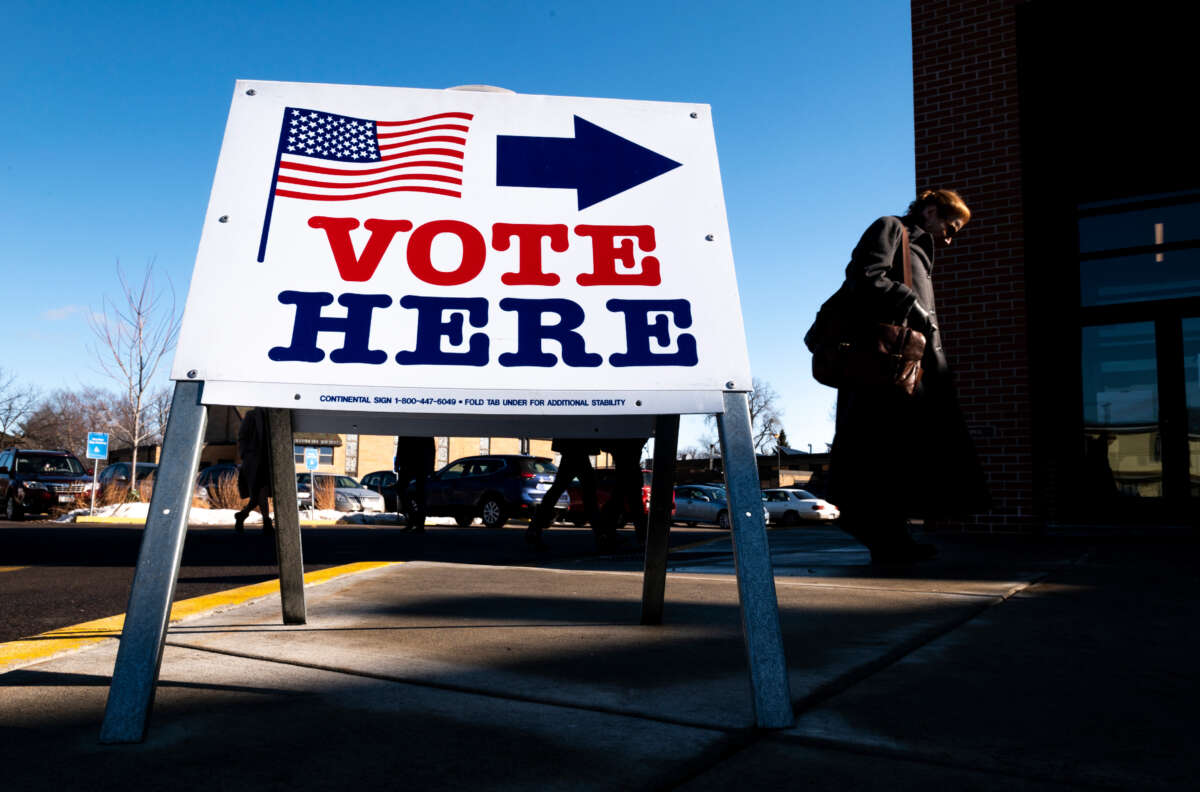Truthout is a vital news source and a living history of political struggle. If you think our work is valuable, support us with a donation of any size.
During debate on an omnibus spending bill in the Minnesota state legislature, a Republican lawmaker said that expanding democracy in the United States is “not a good thing.”
The comment was made by Rep. Matt Bliss (R), who opposed elements of the bill during debate within the Minnesota State House Elections Finance and Policy Committee on Friday.
The bill deals primarily with funding for state and local elections, but also includes a number of election reforms — among them, granting 17-year-olds the ability to register to vote in upcoming elections if they will be 18 by Election Day, as well as instituting an automatic voter registration system.
Another aspect of the bill that Republicans objected to was signing Minnesota on to the National Popular Vote Interstate Compact, an agreement by many U.S. states to award their Electoral College votes to the winner of the national popular vote, no matter the outcome of their own jurisdictions.
The compact is seen as a legal pathway for the popular vote system to be enacted for presidential elections without the need for an amendment to the Constitution, which could take years to complete and would be difficult to pass.
The U.S. Constitution affords states the right to determine how to award electoral votes for selecting the president. Every state in the country currently does so through a popular vote among its own residents, but that wasn’t always the case, particularly in the country’s early years.
Advocates of the National Popular Vote Interstate Compact would use that provision in the Constitution to award a majority of Electoral College votes to the winner of the national popular vote instead. Fifteen states plus Washington, D.C. are currently signed on to the agreement, which can only be enforced once the states that are signed on represent a majority of the Electoral College — 270 votes. If Minnesota agrees to join the compact, the states would still only represent 205 votes, meaning that the compact wouldn’t be enforced.
“If the Agreement Among the States to Elect the President by National Popular Vote governs the appointment of presidential electors, the State Canvassing Board shall declare duly elected the candidates for presidential electors and alternates identified in accordance with the provisions of that agreement,” the proposal in the omnibus bill reads.
The bill, including parts dealing with the compact, advanced on a partisan vote, with eight Democrats in the committee backing the measure and three Republicans in opposition.
“I keep hearing in this committee that we’re a democracy, we need to support the democracy,” Bliss argued before the vote, according to a report from blogger Chris Liebenthal. “We’re not a democracy. We’re a constitutional republic.”
Bliss’s claim that the U.S. is not a democracy is often used by conservatives to dismiss policies that most Americans support. Rep. Lauren Boebert (R-Colorado) recently used the argument to denounce the wishes of a majority of Americans to create new gun laws, for example, as did Republicans in Arizona last fall in an attempt to pass legislation to restrict access to voting.
“The national popular vote, I know some people say it strengthens each individual vote, but this brings us closer to a democracy, which, you know, that’s not a good thing,” Bliss continued.
Bliss falsely asserted that voters in large states like California would overrule Minnesota voters if the bill passed, and said that no candidate for president would ever again originate from Minnesota — a nonsensical assertion that is not based on the compact’s wording whatsoever.
Indeed, because Minnesota is a swing state, close to half of all voters’ wishes go ignored each presidential election year; those voters’ opinions would have more impact under the National Popular Vote Interstate Compact than without it.
Bliss also dismissed the fact that a popular vote system is favored by a majority of voters in the country. “I don’t understand the reasoning behind it. It’s not popular,” he said.
Despite Bliss’s claim, however, polling from Pew Research Center last fall shows that nearly two-thirds of Americans (63 percent) support a model that would select the president based on the popular vote. And while most Republicans are opposed to changing the current system, a sizable portion (42 percent) support abolishing the Electoral College.
Republicans’ opposition to ending the Electoral College may have less to do with their supposed concerns about states’ rights and more with the fact that they rarely win presidential elections through the popular vote. Since 1992, Republicans have won just three presidential races: in 2000, 2004 and 2016. In two of those races, the election was decided through the Electoral College, with the winner losing the popular vote.
A terrifying moment. We appeal for your support.
In the last weeks, we have witnessed an authoritarian assault on communities in Minnesota and across the nation.
The need for truthful, grassroots reporting is urgent at this cataclysmic historical moment. Yet, Trump-aligned billionaires and other allies have taken over many legacy media outlets — the culmination of a decades-long campaign to place control of the narrative into the hands of the political right.
We refuse to let Trump’s blatant propaganda machine go unchecked. Untethered to corporate ownership or advertisers, Truthout remains fearless in our reporting and our determination to use journalism as a tool for justice.
But we need your help just to fund our basic expenses. Over 80 percent of Truthout’s funding comes from small individual donations from our community of readers, and over a third of our total budget is supported by recurring monthly donors.
Truthout has launched a fundraiser to add 340 new monthly donors in the next 5 days. Whether you can make a small monthly donation or a larger one-time gift, Truthout only works with your support.
